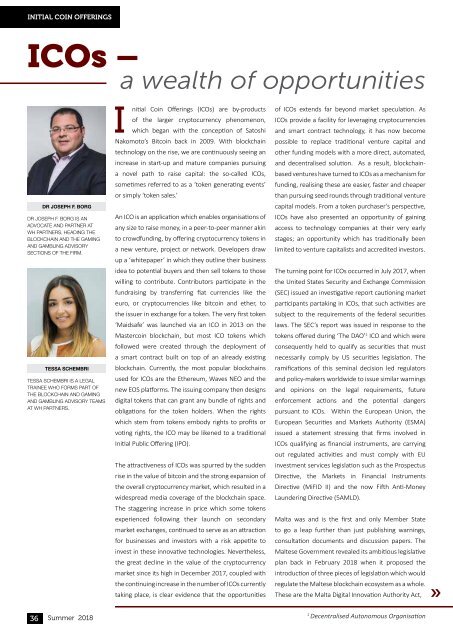ACCOUNTANT_SUMMER18_AMENDED_PG12
You also want an ePaper? Increase the reach of your titles
YUMPU automatically turns print PDFs into web optimized ePapers that Google loves.
INITIAL COIN OFFERINGS<br />
ICOs –<br />
a wealth of opportunities<br />
DR JOSEPH F. BORG<br />
DR JOSEPH F. BORG IS AN<br />
ADVOCATE AND PARTNER AT<br />
WH PARTNERS, HEADING THE<br />
BLOCKCHAIN AND THE GAMING<br />
AND GAMBLING ADVISORY<br />
SECTIONS OF THE FIRM.<br />
TESSA SCHEMBRI<br />
TESSA SCHEMBRI IS A LEGAL<br />
TRAINEE WHO FORMS PART OF<br />
THE BLOCKCHAIN AND GAMING<br />
AND GAMBLING ADVISORY TEAMS<br />
AT WH PARTNERS.<br />
I<br />
nitial Coin Offerings (ICOs) are by-products<br />
of the larger cryptocurrency phenomenon,<br />
which began with the conception of Satoshi<br />
Nakomoto’s Bitcoin back in 2009. With blockchain<br />
technology on the rise, we are continuously seeing an<br />
increase in start-up and mature companies pursuing<br />
a novel path to raise capital: the so-called ICOs,<br />
sometimes referred to as a ‘token generating events’<br />
or simply ‘token sales.’<br />
An ICO is an application which enables organisations of<br />
any size to raise money, in a peer-to-peer manner akin<br />
to crowdfunding, by offering cryptocurrency tokens in<br />
a new venture, project or network. Developers draw<br />
up a ‘whitepaper’ in which they outline their business<br />
idea to potential buyers and then sell tokens to those<br />
willing to contribute. Contributors participate in the<br />
fundraising by transferring fiat currencies like the<br />
euro, or cryptocurrencies like bitcoin and ether, to<br />
the issuer in exchange for a token. The very first token<br />
‘Maidsafe’ was launched via an ICO in 2013 on the<br />
Mastercoin blockchain, but most ICO tokens which<br />
followed were created through the deployment of<br />
a smart contract built on top of an already existing<br />
blockchain. Currently, the most popular blockchains<br />
used for ICOs are the Ethereum, Waves NEO and the<br />
new EOS platforms. The issuing company then designs<br />
digital tokens that can grant any bundle of rights and<br />
obligations for the token holders. When the rights<br />
which stem from tokens embody rights to profits or<br />
voting rights, the ICO may be likened to a traditional<br />
Initial Public Offering (IPO).<br />
The attractiveness of ICOs was spurred by the sudden<br />
rise in the value of bitcoin and the strong expansion of<br />
the overall cryptocurrency market, which resulted in a<br />
widespread media coverage of the blockchain space.<br />
The staggering increase in price which some tokens<br />
experienced following their launch on secondary<br />
market exchanges, continued to serve as an attraction<br />
for businesses and investors with a risk appetite to<br />
invest in these innovative technologies. Nevertheless,<br />
the great decline in the value of the cryptocurrency<br />
market since its high in December 2017, coupled with<br />
the continuing increase in the number of ICOs currently<br />
taking place, is clear evidence that the opportunities<br />
of ICOs extends far beyond market speculation. As<br />
ICOs provide a facility for leveraging cryptocurrencies<br />
and smart contract technology, it has now become<br />
possible to replace traditional venture capital and<br />
other funding models with a more direct, automated,<br />
and decentralised solution. As a result, blockchainbased<br />
ventures have turned to ICOs as a mechanism for<br />
funding, realising these are easier, faster and cheaper<br />
than pursuing seed rounds through traditional venture<br />
capital models. From a token purchaser’s perspective,<br />
ICOs have also presented an opportunity of gaining<br />
access to technology companies at their very early<br />
stages; an opportunity which has traditionally been<br />
limited to venture capitalists and accredited investors.<br />
The turning point for ICOs occurred in July 2017, when<br />
the United States Security and Exchange Commission<br />
(SEC) issued an investigative report cautioning market<br />
participants partaking in ICOs, that such activities are<br />
subject to the requirements of the federal securities<br />
laws. The SEC’s report was issued in response to the<br />
tokens offered during ‘The DAO’ 1 ICO and which were<br />
consequently held to qualify as securities that must<br />
necessarily comply by US securities legislation. The<br />
ramifications of this seminal decision led regulators<br />
and policy-makers worldwide to issue similar warnings<br />
and opinions on the legal requirements, future<br />
enforcement actions and the potential dangers<br />
pursuant to ICOs. Within the European Union, the<br />
European Securities and Markets Authority (ESMA)<br />
issued a statement stressing that firms involved in<br />
ICOs qualifying as financial instruments, are carrying<br />
out regulated activities and must comply with EU<br />
investment services legislation such as the Prospectus<br />
Directive, the Markets in Financial Instruments<br />
Directive (MiFID II) and the now Fifth Anti-Money<br />
Laundering Directive (5AMLD).<br />
Malta was and is the first and only Member State<br />
to go a leap further than just publishing warnings,<br />
consultation documents and discussion papers. The<br />
Maltese Government revealed its ambitious legislative<br />
plan back in February 2018 when it proposed the<br />
introduction of three pieces of legislation which would<br />
regulate the Maltese blockchain ecosystem as a whole.<br />
These are the Malta Digital Innovation Authority Act,<br />
36 Summer 2018<br />
1<br />
Decentralised Autonomous Organisation

















